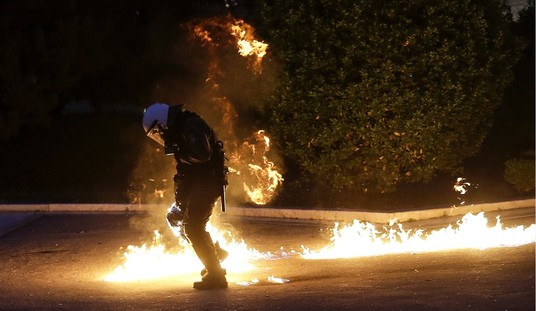The British government’s apparent inability to deal with the problems posed by Islamic extremism is being highlighted once again, this time by the news that Muslim gangs are threatening to take control of a high-security jail whose inmates include al-Qaeda-linked terrorists.
Staff at Whitemoor prison in Cambridgeshire are warning that several wings have become dominated by gangs of Muslim prisoners, and that a “serious incident” is imminent. Between a quarter and one-third of the jail’s 500 or so inmates are Muslim, and while most are serving sentences for offenses unrelated to terrorism, they’re held alongside extremists like Saajid Badat, who’s serving 13 years for plotting with Richard Reid to blow up transatlantic airliners with shoe bombs.
A report by Prison Service officials identifies an “ongoing theme of fear and instability” among staff at Whitemoor, and says the large number of Muslim inmates appears to be “engendering fear and handing control to the prisoners.” The Observer story linked above adds that white prisoners arriving at the jail are routinely warned about the Muslim gangs by staff.
While some of the blame for the situation is put down to poor training of prison officers, low morale, and lack of “cultural sensitivity,” the Prison Service report adds that staff at the jail “appeared reluctant to challenge inappropriate behavior, in particular among BME (black and ethnic minority) prisoners for fear of doing the wrong thing,” which was leading to the “power dynamic” shifting towards inmates.
And, all too predictably, the government’s response to the situation at Whitemoor reads like a satire on officialdom hobbled by the demands of multiculturalism and political correctness:
“It is vital that prison staff are equipped with the knowledge and skills to ensure they have the confidence to identify and challenge behavior that is of concern,” said a spokeswoman for the Ministry of Justice. “A program of work is planned at Whitemoor to increase mutual understanding between staff and prisoners, including a development day for staff on the Muslim faith, focus groups in which staff and ethnic minority prisoners will discuss prison community issues, and diversity events.”
Faced with the threat of violence from gangs — Muslim or otherwise — prison officers at Whitemoor would probably prefer Tasers and pepper spray to development days, focus groups, and diversity events, but the official response is entirely in keeping with the muddled thinking that pervades Gordon Brown’s government when it comes to dealing with Islamic extremism. Ministers appear torn between trying to reassure the public that they’re being tough on terror on the one hand, and avoiding causing offense to “moderate” Muslims on the other — notwithstanding the fact that genuinely moderate Muslims shouldn’t be offended by reasonable measures taken to protect British citizens from terror attacks.
The tensions at Whitemoor appear to be more extreme versions of those that stem from the inability — or refusal — of many Muslims to fully integrate into British society: a sense of victimhood, often paradoxically combined with notions of superiority, along with demands for special treatment and exemption from certain rules.
In the case of Whitemoor, it appears that officials are reluctant to confront the gangs. The safety of inmates and staff is obviously a pressing concern, and if cutting Muslim inmates a little slack prevents an outbreak of violence then it’s obviously tempting for the authorities to take the line of least resistance — as was the case a couple of years ago when guards in one English jail were banned from wearing tie-pins featuring the cross of St. George for fear of offending Muslim inmates.
But the problem goes beyond the immediate threat to security at Whitemoor and other jails — radicalization of Muslim prisoners is also a serious concern. The UK’s prison system has become a recruiting ground for al-Qaeda sympathizers in recent years, and fears over radicalization have led to prisoners being moved from jails that have experienced similar problems to those identified at Whitemoor. If a failure to confront the extremists gives them a free hand to radicalize fellow inmates and plot terror attacks, the consequences could be disastrous.
The authorities would do well to get a grip on the problem while they still have a chance. The number of Muslims in Britain’s jails has soared over the past few years, due in part to terrorism, but mostly because of disproportionate levels of “ordinary” crime committed by both illegal immigrants and young British Muslims. In 2006 there were more than 8,000 Muslims in British jails — 11% of the total prison population, with the figure having risen fourfold since 1993. Just over half that number, 6%, were British nationals, which is roughly double the percentage of Muslims in the population as a whole; the rest were foreign nationals. One in four was serving time for drug offenses.
The threat of radicalization isn’t confined to British jails. Muslims are heavily over-represented in the prison populations of most European countries, with the disparity being most spectacular in France, where between 60% and 70% of prisoners are estimated to be Muslims, despite Muslims making up only about 12% of the population. Prison authorities in the country are working to place moderate imams in prisons to counter the influence of extremists.
In the U.S., estimates for the numbers of Muslim prisoners vary considerably — in testimony before a Senate security sub-committee in 2003, Professor J. Michael Waller put the figure as high as 17-20% of the prison population, or roughly 350,000 inmates. Whatever the exact number, the vast majority are African-Americans who have converted to Islam in prison, rather than Arab or Asian Muslims, and gang-related activity is viewed as a greater danger than terrorism.
Nevertheless, authorities are still alert to the threat of radicalization, and a 2006 report produced by Homeland Security officials draws extensively on Europe’s experience. Its authors warn that “every radicalized prisoner becomes a potential terrorist recruit,” and call for action to address the problem “before it materializes as a terrorist attack.” The British government needs to demonstrate a similar awareness of the threat, and a similar sense of urgency in tackling it.









Join the conversation as a VIP Member